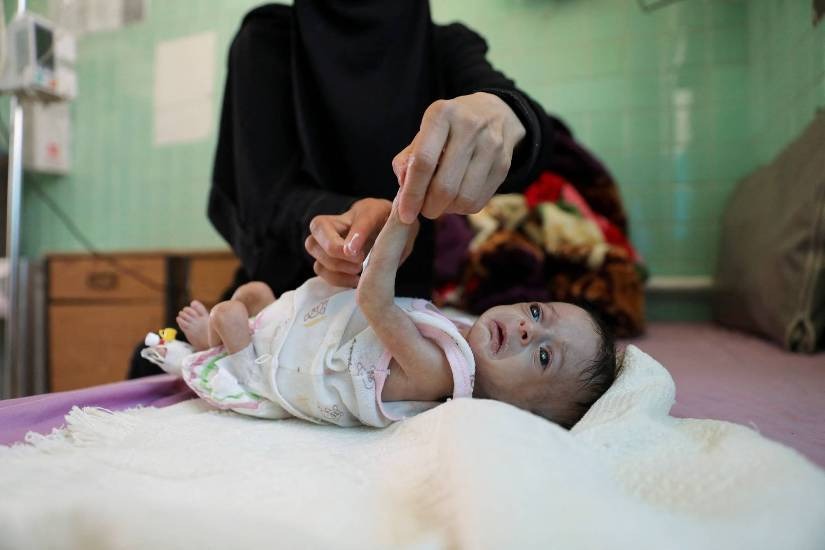


Barran Press
A UN report released on Sunday, August 18, 2024, revealed a rapid escalation of acute malnutrition in Yemen, particularly in areas controlled by the Yemeni government. The report, seen by "Barran Press", highlighted the Western coast as experiencing “extremely critical” levels of malnutrition for the first time.
The report, published by the United Nations Children's Fund (UNICEF), stated that the Integrated Food Security Phase Classification (IPC) Technical Working Group in Yemen identified the governorates of Hodeidah and Taiz as having the highest prevalence of acute malnutrition.
These governorates already face the highest rates of stunting or chronic malnutrition, with repeated deprivation exacerbating chronic malnutrition among children in these regions.
According to the latest IPC acute malnutrition analysis, the number of children under five suffering from acute malnutrition, or wasting, increased by 34% compared to the previous year in all areas controlled by the Yemeni government, affecting over 600,000 children, including 120,000 severely malnourished.
The report attributed the sharp rise to the combined impact of disease outbreaks (cholera and measles), severe food insecurity, limited access to safe drinking water, and economic deterioration.
"In the same catchment area, an estimated 223,000 pregnant and lactating women were found to be acutely malnourished in 2024," the report stated.
The report further explained that the most severe level in the IPC acute malnutrition classification, known as “extremely critical acute malnutrition” (IPC Phase 5), applies to areas where the prevalence of acute malnutrition exceeds 30%.
"For the first time, this level was reported in the southern lowlands of Hodeidah (districts of Al-Khokha and Hays) and the lowlands of Taiz (district of Mocha) during the period from November 2023 to June 2024. In Hodeidah, the prevalence of acute malnutrition rose to 33.9% from 25.9% year-on-year," the report said.
The report quoted UNICEF Representative in Yemen, Peter Hawkins, as saying, "There is a worrying trend of acute malnutrition among children in southern Yemen."
He added, "To protect the most vulnerable women, girls, and boys, investing in and scaling up prevention and treatment efforts is more important than ever."
"We will continue to do everything we can, including building on the current multi-sectoral response, to combat life-threatening forms of malnutrition so that children can survive and thrive to their full potential," Hawkins stated.
Dr. Hussein Gadain, FAO Representative in Yemen, said, "The alarming rise in acute malnutrition among children under five in areas under the control of the Yemeni government underscores the severe impact of disease outbreaks, severe food insecurity, and limited access to basic services. FAO remains committed to supporting the restoration and sustainable diversification of agricultural livelihoods to help meet urgent needs."
He noted that Yemen, engulfed in a protracted conflict and economic collapse, suffers from the highest rates of malnutrition in the world. The ongoing conflict, economic instability, and recurrent disease outbreaks remain the primary drivers of the country's malnutrition crisis.
Pierre Honore, WFP Representative and Country Director in Yemen, explained, "WFP is currently forced to provide smaller rations, and these findings should be a wake-up call that lives are at stake."
"It is crucial to intensify support for the most vulnerable who may sink deeper into food insecurity and malnutrition if current low levels of humanitarian funding continue," Honore added.
Dr. Arturo Bisiguan, WHO Representative in Yemen, stated, "The high level of acute malnutrition among children under five in Yemen also indicates that diseases are a concern. Integrated health and nutrition services, including child illness management, ensuring up-to-date immunization, and appropriate feeding practices, are crucial to address health and nutrition emergencies. This is in addition to ensuring access to sufficient nutritious food and safe drinking water. Humanitarian actors and the international community must take immediate action to protect the future of Yemen's children."
According to the report, childhood illnesses, alongside cholera and measles outbreaks, coupled with limited access to safe water and sanitation services, contribute to the high rates of acute malnutrition in Yemen.
The report stated that the four UN agencies are calling for urgent and sustained international support and immediate action to address the root causes of acute malnutrition by strengthening existing social protection, health, food, water, sanitation, and hygiene systems.
It highlighted that ending the nearly decade-long conflict and restoring peace are crucial to addressing the challenges and building the resilience of the Yemeni people in the face of a lack of basic services, repeated displacement, and shattered economic and social systems.